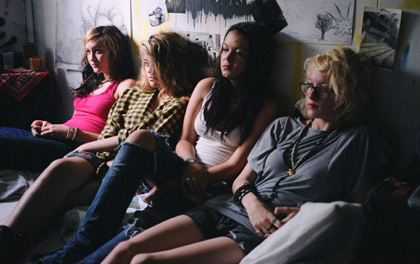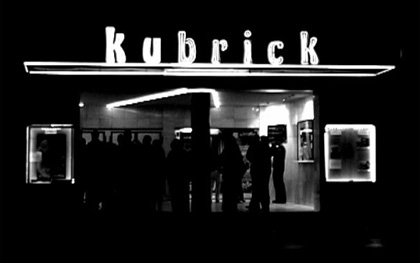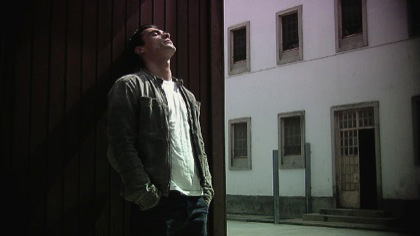Festival report
IndieLisboa 2010: the new school

‘Largely mesmerising’: A History of Mutual Respect
Mar Diestro-Dópido dodges ash and strikes to find a thriving IndieLisboa festival brimming with young international talent
As luck would have it, and despite the volcanic ash swirling over Europe, I travelled to IndieLisboa the day after the ban on flights was lifted at Heathrow, with only some small delay. The effort to get there was, as always, more than handsomely repaid. The focus for the festival’s three artistic directors in 2010 (its seventh edition) was not so much on the quantity of films, which remained similar to previous years, but on achieving greater visibility in order to reach new audiences. For this edition, it transpired that IndieLisboa had attained first position in terms of national funding priorities, which meant an increase in money and a much flashier festival headquarters, equipped with two screening rooms. It also meant that you could see extracts of Bill Douglas’ My Way Home (1978), Bong Joon-ho’s Mother (2009) or Hou Hsiao-hsien’s Dust in the Wind (1986; all playing at the festival) on screens in Lisbon tube stations – trains and cinema, a truly historic liaison.
In a nice twist on the regular Independent Hero slot this year was given over to a Berlin Forum retrospective – although two films in the festival proved that, aside from its glorious past, the Forum still has a handle on exciting developments in the present.
Matthew Porterfield’s Putty Hill
American indie has felt like an exhausted seam for some time now, but that changed when I saw Putty Hill. Director Matthew Porterfield shot the film in his hometown of Baltimore, exploring the impact of the untimely death of one of its young members of a drug overdose on a small, very close-knit community. Porterfield’s approach gets to the core of the matter without patronising or manipulating, feeling honest and touching. He gently immerses the viewer in the troubled reality at the heart of this community, allowing its members to tell us their stories, sometimes by way of actual interviews. Sitting somewhere on the border between documentary and fiction, Porterfield’s position with regard to his subjects feels very similar to that of Jose-Luis Guerín in En Construcción (2001) or Pedro Costa in In Vanda’s Room (2000, the latter an avowed influence), ultimately achieving an incredibly raw, intimate directness. How does he do it? Probably because, above all – and against the grain of the film’s ostensible subject matter – Porterfield focuses on the positives of this community, and in particular the deeply rooted relationship that its members have with this place, palpable in every frame. Nothing this inspiring has emerged from the American indie scene in a long time.
From Sweden there was an IKEA nightmare in the shape of Henrik Hellström and Fredrik Wenzel’s Burrowing. Eleven-year-old Sebastian introduces us to his community in a quiet, unnamed Swedish suburb, a seemingly perfect and self-contained place in which everything – houses, cars, kitchens, people – appear harmonious and eerily similar. We soon become aware of the deep cracks fissuring Sebastian’s neighbourhood and the tension that crawls underneath the smooth surface; once revealed, this calm and stillness paradoxically becomes a source of violence. This is a truly disturbing existential tale whose strangeness sometimes echoes Dogville (2002) or, more tangentially, its compatriot Let the Right One In (2008).
Admittedly I’m not the world’s biggest fan of Johnny To (a former Independent Hero at the festival), so Accident – directed by Cheang Pou-soi and produced by To – was an unexpected pleasure. The film follows a group of killers as they stage the assassination of triad members as accidents. Soon mistrust amongst the group prompts them to question if they are also the victims of staged attempts to kill them. Located in a grey, rainy and forever dystopian Hong Kong, Accident benefits massively from underplayed acting and subdued but sleek cinematography. The pace is also key, and although the film mostly centres on the staging of one killing, the tension built around it is released in small, calculated doses that lead the viewer into an ending that proves no matter how much we try to manipulate reality, the natural course of events will always prevail, as will the inevitability of life and death. Accident will stay with you longer that you might expect.

Chus Domínguez’s Leaving (La sortie)
Three Spanish works stood out from the short films programme. Mudanza, Père Portabella’s film about the removal of furniture from the museum of García Lorca’s family, proves that the spirit of the Granada poet is still inspiring and stirring. Portabella’s camera seems to stand in for Lorca’s gaze, floating over the actions in a choreographed effect (the piano, the undisputable protagonist of Portabella’s magnificent The Silence Before Bach, also captures most attention here). Halfway through, the film shifts from recording the act of emptying to the recording of emptiness itself, the camera moving agonisingly slowly through doors, corridors and stairs as if searching for Lorca’s essence in his family house. The film ends its journey on his belongings, ready to be collected, piled up and individually wrapped, inert symbols of a past life now deprived of their function.
In Leaving (La sortie), an ode to cinema and community, director Chus Domínguez captures with beautiful simplicity the destruction of small family cinemas to the giant chains. The film shows staff as they exit for the last time the Cine Kubrick in León (in a nod to the Lumières’ La sortie des ouvriers de l’usine (1896), Lumière, La Sortie was the film’s original title) whilst we hear the testimonies and opinions of the small group of people that worked and ran that cinema for years.
In The Dielman Variations – Fernando Franco’s short film-essay on Chantal Akerman’s Jeanne Dielman 23, Quai du Commerce, 1080 Bruxelles (1975) – space and time are manipulated and transformed into a spectre of everyday routine. Deconstructing the original film, Franco superimposes several extracts, doubling and tripling everyday gestures like closing doors or cleaning the kitchen table. By juxtaposing these actions twice and three times with a few seconds’ difference between them, Franco successfully highlights the banality of Dielman’s life, the solitary traces and meaningless gestures of this Belgian prostitute.

João Trabulo’s No Company
As for the Portuguese films on show, the general tendency was for engagement with the country’s history and politics, a stance that sat perfectly with the Carnation Revolution anniversary march that takes place every year right outside one of the cinemas participating in the festival – the São Jorge, located on Avenida Libertad – greeting cinemagoers every 25 April with the spicy scent of red carnations.
Opening the festival was Fantasia Lusitana, a montage of Salazarist propaganda films depicting a happy, utopian Portugal that couldn’t have been further from the truth, inevitably drawing attention to notions of collective and historical memory. In Guerra Civil director Pedro Calda explores teenage angst, isolation and cross-generational unhappiness in the 1970s, leaning heavily on British music in the process (in particular Joy Division), but with a predictability that borders on cliche.
João Botelho’s Oh Lisboa, meu Lar is a visual love letter to the city expressed through the poems of Fernando Pessoa. And in João Trabulo’s prison documentary No Company, the two inmate protagonists’ activities include air-orchestra conducting and reciting poems that describe their own personal situation, including their pasts (and futures) outside prison.
But the film that created the loudest buzz at the festival sat awkwardly alongside these other works. Co-directed by its two (very young) protagonists on a micro-budget, A History of Mutual Respect (pictured at top) takes us on a philosophical and existential journey into the jungle in search of utopian sexual purity. Once that sexuality is located in the shape of an indigenous young woman, the purity of the friendship between the protagonists quickly disappears to reveal only the selfish emptiness of the strongest predator.
Unafraid to tackle big themes such as race, sexuality, miscegenation, time, and first-/third-world relations and exploitation, Daniel Schmidt and Gabriel Abrantes – the former American, the latter a Portuguese film-maker with five other shorts to his name – at times manage to create moments of sublime stasis, as in the opening scene, where we hear the husky voice of Nina Simone over a pan across a majestic waterfall. But it is cinematographer Natxo Checa (who allegedly had never used a film camera before) who lifts this short film onto an entirely new level, revealing an exquisite ability to capture and transmit emotions. The result is refreshingly ambitious and largely mesmerising, if a tad too self-conscious at times.
See also
Views from the edge: Kieron Corless revisits Chantal Akerman’s D’Est at IndieLisboa (Festival postcard, April 2010)
Crossing the threshold: Kieron Corless interviews Pedro Costa (October 2009)
Game for a century: Jonathan Romney on Manoel de Oliveira (December 2008)
Songs for swinging lovers: Tony Rayns on Hou Hsiao-Hsien’s Three Times (August 2006)
Memories of Murder (Bong Joon-ho) reviewed by David Jays (August 2004)
Keeping a distance: Janet Bergstrom on Chantal Akerman’s Jeanne Dielman 23, Quai du Commerce, 1080 Bruxelles (November 1999)
